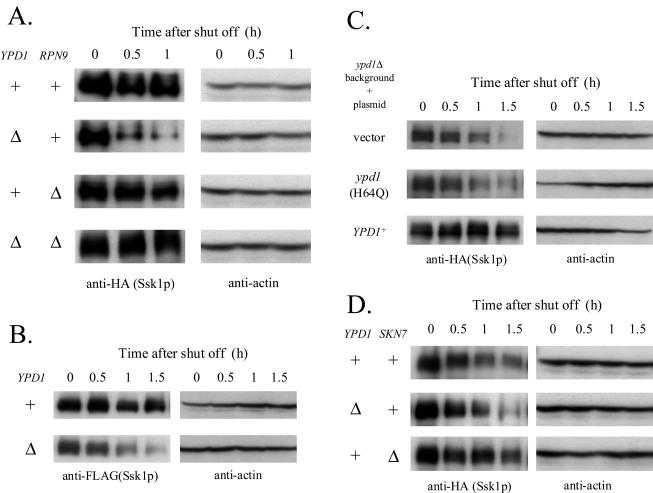FIG. 3.
The stability of Ssk1p is dependent on both the phosphotransfer and the proteasome system but not on the SKN7 pathway. (A) The stability of Ssk1p is dependent on the phosphotransfer from Ypd1p and the proteasome system. C-terminally tagged Ssk1p was expressed from the low-copy-number plasmid pNS114 in the YPD1+ ssk1Δ hog1Δ RPN9+ (NS318), ypd1Δ ssk1Δ hog1Δ RPN9+ (NS320), YPD1+ ssk1Δ hog1Δ rpn9Δ (NS337), and ypd1Δ ssk1Δ hog1Δ rpn9Δ (NS336) strains, and the Ssk1p content was monitored by Western blotting. (B) N-terminally three- FLAG-tagged Ssk1p is also degraded in a phosphorelay-regulated manner. N-terminally three-FLAG-tagged Ssk1p was expressed from the low-copy-number plasmid pTB426 in NS318 and NS320 strains, and the Ssk1p content was monitored. (C) Ypd1p-Ssk1p interaction does not affect the stability of Ssk1p. NS320 strains with pNS114 were transformed with pRS416 (vector), pFP57 (ypd1 [H64Q]), or pNS476 (YPD1+), and the Ssk1p content was monitored. (D) Deletion of SKN7 does not reduce the stability of Ssk1p. Tagged Ssk1p was expressed by pNS462 in NS318, NS320, and skn7Δ ssk1Δ hog1Δ (NS325) strains, and the Ssk1p content was monitored. +, present; Δ, deleted.

